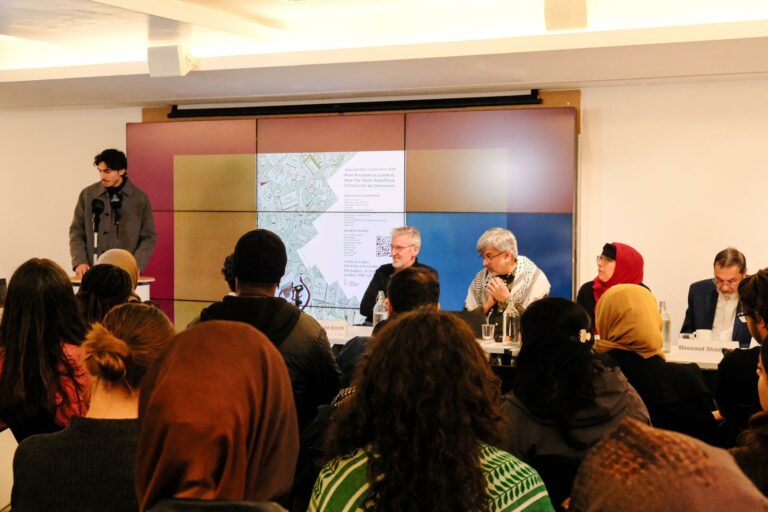—————————————————–
Islamic Human Rights Commission
—————————————————–
18 May 2006
New IHRC Report on Islamophobia, Double Standards and Discrimination in British Legal System
‘Law and British Muslims: Domination of the Majority or Process of the Balance’. A report by Saied R. Ameli, Beena Faridi, Karin Lindahl and Arzu Merali for the Islamic Human Rights Commission. Publication date: 18th May 2006, ISBN 1-903718-32-5, £8 pp 101
Summary available at:
https://www.ihrc.org.uk/show.php?id=1865
To order a copy of the full report, please call the office on (44) 20 8904 4222 or visit our on-line shop:
https://www.ihrc.org.uk/catalog/product_info.php?cPath=23&products_id=47
IHRC’s fifth report in the British Muslims’ Expectations of the Government series is published today, Thursday 18 May 2006. The report focuses on law and minority rights, using qualitative and quantitative research regarding Muslims’ experiences and expectations of the law.
The report overviews and critiques the current legal system and looks at the normative and theoretical case for reform, including definitions of minority rights, the creation of dual legal processes for people of minority faiths, and a recognition of Muslim and other faith identity within the legal system and government. It reports on the survey data of the nationwide survey of Muslims undertaken for the project of 1125 respondents as well as qualitative responses used to interrogate these findings.
The results show that whilst an overwhelming 91% of respondents respect British law, most of those who were questioned in detail stated that they believed the law is unfair and furthermore only a handful feel protected by the law.
Respondents mainly cite the police to be the greatest cause of conflict.
There was an overwhelming response that the law neither recognised nor protected Muslims and that it was hostile to Muslims as a result of their faith.
One of the report’s authors, Arzu Merali said:
“At a time when ministers are talking about ‘appropriate’ Muslim expectations, this report shows yet again that not only do Muslims have a sophisticated understanding of the law and parliamentary structure, they believe in bettering not rejecting a system they can demonstrate discriminates against them.
“The expression of Muslims’ expectations of the law or any other facet of life in this country are part of their basic rights as citizens. To deny them that voice only confirms the perception that Muslims are second-class citizens. If this government is serious about radical reform and change in the name of a better society it needs to listen to the views expressed and engage with them. To simply ignore people’s expectations is simply to remove government from the will of the people even further.”
Reviews of this report from Professor Roberto Mangabeira Unger of, Harvard Law School, USA, Asim Qureshi of Stop Political Terror and Baroness Pola Uddin follow.
————————————————————————————————-
Reviews
————————————————————————————————-
Professor Roberto Mangabeira Unger of, Harvard Law School, USA
“The kernel of Islam and of the teachings of its Prophet lies in revealing and embracing the relation between the radical transcendence of God and the radical liberation of each human being. This doctrine is a priceless treasure of all humanity. In many western countries, Muslims are now threatened by harassment, intimidation, insecurity and bigotry. To come to their defense is a sacred duty of those who are committed to democracy under law as well as those who believe in the universality of the message of whch Muslims are the bearers. This report will be a powerful weapon in the fulfillment of this task. It shows how the rule of law can be reconciled with the recognition and with the enhancement of particularity – particularity of faith and of experience – in the United Kingdom and throughout the world. It is at once an argument of reason and an expression of hope.”
Asim Qureshi, spokesman for Stop Political Terror
“The disparity between the Muslim community living in the UK and the general British public is something that must be addressed. There is a basic assumption by many that the Shari’ah (Islamic Law) is completely incompatible with a secular democratic legal system. What these assumptions are based upon, are the very clear differences the Muslim community has in terms of certain aspects of substantive law, for example the rules against drinking of alcohol and fornication. Also these assumptions are based on ignorance of the holistic nature of the Shari’ah which legislates every aspect of life from the way in which Muslims eat to the way they run their affairs of State. For the Muslim people, every action they take must be in line with Al Maqasid Al Shari’ah (the aims of Islamic Law) which require the law to protect man in his life, liberty, possessions, intellect, religion and honour. Thus, as long as a Muslim is fulfilling these aims within the bounds of the substantive Islamic law, he is fulfilling his obligations to his religion. The rule of law strongly agrees with the aims of the Shari’ah, and it is this that should be taken as the starting point.
“The rule of law has been abused to such an extent that it is barely recognisable when set against the strong philosophical roots it developed from. This has not gone unnoticed by the Muslim community who see a wave of anti-terrorism legislation and poor foreign policy which seem to go against its very fundamentals. The Muslim community has much value to add to the way in which the law develops in the UK to accommodate for all ethnic and cultural backgrounds, however it is difficult to do so while on the back foot. This Report by the Islamic Human Rights Commission serves to deal with these issues in an academic and insightful way. Not only have they identified the problems that have been faced within the law, but also have made recommendations which all policy makers must pay close attention to. The way has been paved for true understanding of Muslim needs within the UK legal system; all it takes now is to walk it.”
Baroness Pola Uddin
“This is a timely discussion about the impact of our laws on the Muslims in Britain, drawing on the substantial experiences of other minorities (women and the Jewish communities) and the change that has bettered out legislation and practice. This volume looks at the problems created as result of the recent anti terror legislations as well as the impact of 7/7 and highlights the way the community itself is feeling the brunt of these measures.
“Beyond the immediate impact of any discriminatory implementation and the feeling from respondents that there is immense anti-Muslim prejudice within the legal and political system come emphatic voices of hope. Coupled with this are aspirations for a better legal system that reflects Muslim and other minority concerns. This volume highlights the need for a grassroots understanding for the promotion of better law and practice in the U K and an emphatic call for a substantially more reflective workforce which operate them.”





